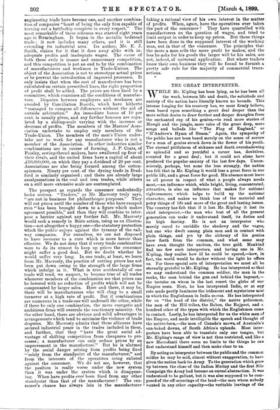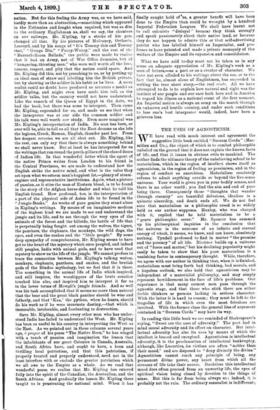THE GREAT INTERPRETER.
WHILE Mr. Kipling has been lying, as he has been all the week, between life and death, the solicitude and anxiety of the nation have literally known no bounds. This
intense longing for his recovery has, we most firmly believe, been based upon something a great deal deeper than the mere selfish desire to draw further and deeper draughts from the enchanted cup of his genius,—to read more stories of Mowgli and the jungle, more tales of the great deep, more
songs and ballads like "The Flag of England," or " M'Andrew's Hymn of Steam." Again, the sympathy of the public has not been based merely on the sense of sorrow for a man of genius struck down in the flower of his youth. The eternal pitifulness of sickness and death overshadowing so splendid and so youthful a career has, doubtless, counted for a great deal ; but it could not alone have produced the popular anxiety of the last few days. Uncon- sciously, perhaps, but none the less strongly, the nation has felt that in Mr. Kipling it would lose a great force in our public life, and a great force for good. His absence must leave us all poorer in respect of what a people always needs most,—an influence which, while bright, living, concentrated, attractive, is also an influence that makes for national righteousness, • which helps to build up the national character, and makes us think less of the material and petty things of life and more of the great and lasting issues. The country has felt that if it lost Mr. Kipling it lost its chief interpreter,—the man who best of all the present generation can make it understand itself, its duties and its high destiny. He is not an interpreter who merely cared to unriddle the shadowy And the vague, but one who dwelt among plain men and in contact with plain things, and yet by the alchemy of his genius drew forth from the common, and what some may have even thought the unclean, the true gold. Mankind find too few such interpreters, and having one in Mr. Kipling, they realise how ill he could be spared,—how, in fact, the world would be darker without the light he offers us. For three special acts of interpretation we must all be eternally grateful to Mr. Kipling. He has interpreted so that we may understand the common soldier, the man in the ranks, the man behind the gun and behind the bayonet,— the tortoise on whom in the last resort the globe of our Empire rests. Next, he has interpreted India, or at any rate made partly luminous the iridescent and mysterious mist in which the Englishman in India moves. He has interpreted for us "the head of the district," the native policeman, the men of the Hill tribes, the Baboo, the Bajpoot, and a hundred other of the types with which the Englishmen come in contact. Lastly, he has interpreted for us the white men of the Empire, and made intelligible the speech and thought of the native-born,—the men of Canada's snows, of Australia's sun-baked downs, of South Africa's uplands. Most inter- preters have been able to translate only one tongue, but Mr. Kipling's range of view is not thus restricted, and like a new Mezzofanti there seem no limits to the things he can first understand himself and then make clear to us.
By acting as interpreter between the public and the common soldier he may be said, almost without exaggeration, to have given the nation back its Army. To the generation which grew up between the close of the Indian Mutiny and the first Nile Campaign the Army had become an unreal abstraction. It was understood to be gallant, but it was also supposed to be com- posed of the off-scourings of the land—the men whom nobody wanted in any other capacity—the veritable leavings of the
nation. But for this feeling the Army was, as we have said, hardly more than an abstraction,—something which appeared in the Estimates and fought when required, but was as dim to the ordinary Englishman as, shall we say, the shunters on our railways. Mr. Kipling, by a stroke of his pen, changed all that. By his pictures of Mulvaney, Ortheris. Learoyd, and by his songs of "It's Tommy this and Tommy that,' " Gunga Din," " Fuzzy-Wuzzy," and the rest of the "Barrack-Room Ballade," the public were made to realise that it had an Army, not of War Office dummies, but of "hungering, thirsting men," who were well worth all the love, honour, respect, and pity that the nation could spare. And Mr. Kipling did this, not by preaching to us, or by putting up an ideal man of straw and labelling him the British private, but by showing us the soldier in his habit as he lives. A mere realist could no doubt have produced as accurate a model as Mr. Kipling, and might even have made him talk as the soldier talks, but the country would not have understood. Like the eunuch of the Queen of Egypt in the Acts, we had the book, but there was none to interpret. Then came Mr. Kipling, expounded for us, and made us see that when the interpreter was at our side the common soldier and his talk were well worth our study. Even more magical was Mr. Kipling's interpretation of India. No man has been, or ever will be, able to tell us all that the East dreams as she lets the legions, Greek, Roman, English, thunder past her. From her deepest reveries we are all shut out. Mr. Kipling, like the rest, can only say that there is always something behind we shall never know. But at least he has interpreted for us the writings that run round the porch-pillars of the closed doors of Indian life. In that wonderful letter which the agent of the native Prince writes from London to his friend in the Central Provinces, we are made to understand how the English strike the native mind, and what is the value they set upon what we esteem man's happiest lot,—plenty of steam- engines and representative institutions. Again, what a picture of passion, as it stirs the man of Eastern blood, is to be found in the story of the Afghan horse-dealer and what he told his English friend. How profound, too, is the interpretation of a part of the physical side of Asian life to be found in the "Jungle-Books." As works of pure genius they stand alone in Kipling's writings. By means of an imaginative medium of the highest kind we are made to see and understand the jungle and its life, and to see through the very eyes of the animals of the forest and the hillside, the battle of life that is perpetually being fought out among the wolves, the tigers, the panthers, the elephants, the monkeys, the wild dogs, the apes, and even the snakes and the " little people." By some deep sympathy of comprehension, Mr. Kipling seems to have got to the heart of the mystery which once peopled, and indeed still peoples, India with animal gods, and to have used that mystery to show us the life of the jungle. We cannot profess to trace the connection between Mr. Kipling's talking wolves, monkeys, elephants, panthers, and snakes, and the brutish gods of the Hindoo mythology, but we feel that it is there. The something in the animal life of India which inspired, and still inspires, the worshippers of the brute creation touched him also, and inspired him to interpret it for us in the lower terms of Mowgli's jangle friends. And so well was his task accomplished that it seems no more than natural that the bear and the great black panther should be wise and fatherly, and that Kaa,' the python, when he hunts, should do his work as if be were incarnate destiny,—that which is inexorable, intolerable, and fascinating to destruction.
Save Mr. Kipling, almost every other man who has under- stood India has failed to understand the West. Mr. Kipling has been as useful to his country in interpreting the West as the East. As we pointed oat in these columns several years ago, a propos of his poem "The Native Born," be has winged with a touch of passion and imagination the lesson that the inhabitants of our great Colonies in Canada, Australia, and South Africa have, and ought to have, a keen and thrilling local patriotism, and that this patriotism, if properly treated and properly understood, need not in the least interfere with or exclude the greater patriotism which we all owe to the Empire as a whole. As we read that wonderful poem we realise that Mr. Kipling has entered fully into the spirit of the Canadian, the Australian, and the South African. And gradually the lesson Mr. Kipling there taught us is penetrating the national mind. When it has
finally caught hold of sus, a greater benefit will have been done to the Empire than could be wrought by a hundred Imperial Federation Leagues. We shall have learnt not to call colonists " disloyal " becausa they think strongly and speak passionately about their native land, or because they do not happen to admire this or that self-advertising patriot who has labelled himself an Imperialist, and pro- fesses to have patented and made a private monopoly of the welfare of the Empire and its expansion and consolidation.
What we have said to-day must not be taken as in any sense an adequate appreciation of Mr. Kipling's work as a man of letters,—as a poet or as a creator of character. We have not even alluded to his writings about the sea, or to the fact that he, almost alone of Englishmen, has succeeded in writing the true short story,—the real code. All we have attempted to do is to explain how natural and right was the instinct of our people and our race both here and in America to regard his illness as a national event of the first moment. An Imperial nation is always an army on the march through an unknown and hostile country, and under such conditions to lose one's best interpreter would, indeed, have been a grievous loss.







































 Previous page
Previous page